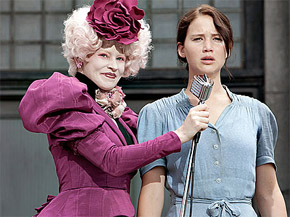Mythology: The Hunger Games
By Martin Felipe
March 23, 2012
BoxOfficeProphets.com

The real reason, however, that I’ve decided to forgo Dead talk until its October return is that an even bigger phenomenon has eclipsed it in the zeitgeist. I usually talk TV here, but occasionally a mythology heavy film series captures my attention and I’m hardly the only one. Most of the shows I talk about here have tiny audiences, but pretty much the entire known universe is familiar with The Hunger Games.
The gist of it is pretty well known - an annual televised battle to the death between 24 teens in a dystopian future America. As with most of these mythologies, the core of it all is nothing new to us. Folks have compared the death fight to Battle Royale, The Running Man and The Long Walk. What separates Hunger from other sci-fi reality show mythologies is the same as any other familiar mythology, the world-building details.
I bristle a bit when I read the nonsense about Hunger Games being a Running Man for teenagers. By this logic, Back to the Future is American Graffiti with a Delorean because they both take place in the ‘50s. Thing is, there’s that old saw about there being really only seven actual stories that we tell over and over again. I don’t know if that’s entirely accurate. I’ve never done the math, but the idea behind it is true. It’s not the story that’s unique, it’s the presentation.
And the presentation of a teenage female lead is significant, not just as compared to Running Man’s Arnold, but also when compared to the other teen hits of the moment. I also bristle when folks compare Hunger Games to the other huge female teen phenom of the day, Twilight, though folks often do.
Problem with this is that the Twilight films really do condescend to their target audience. They feature the safest forbidden love story imaginable. You have a lead character who falls in love with a vampire. A vampire. Sounds pretty dangerous, huh? The thing is, it’s not. Here’s a romantic lead who is one of folklore’s most deadly monsters and yet, he never does anything deadly. He just moans and groans all day about what a threat he is to his poor little victimized love Bella without ever showing why he’s a threat. It’s a vampire story without blood.
Compare this to Hunger Games, a vampire-free story with tons of blood, where the stakes are exponentially higher. Lead character Katniss is not only aware that these folks around her are going to have to die in order that she might live, but (Spoiler alert!) they actually do. Author Suzanne Collins has faith in her younger readers that they’ll be able to handle the violence necessary in such a mythology, while Twilight’s Stephenie Myer wants to shield her poor, delicate fans. She relies on the known nature of vampires to do her work for her, allowing her to present us with a very chaste and sanitized version of what Bella risks when she hooks up with Edward.
I think this is part of the reason that The Hunger Games has transcended its teen following, Harry Potter style. It respects readers. Yes, there is some talk about narrative shortcuts and other flaws. Some criticism is valid. Some of it is nonsense. To this I just roll my eyes. You know what other writer has narrative shortcuts and other flaws? A dude named William Shakespeare. That’s right, ALL stories have flaws. This is not to say that we should ignore the flaws in Hunger Games. It’s just that when you have a tale designed for teens, the adult claws tend to come out. Again, Games appeals to adults as much as to teens. The trouble is, some adults are a little embarrassed about that, so they tend to draw undue attention to the flaws, rather than celebrating what Collins gets right. When you get down to it, the quality far overshadows the weaknesses, the simplest measure of good storytelling.
She’s created a living, breathing alternate future, criticizing our present day reality show culture, with a well developed, complex female protagonist. Although Katniss is flawed, she isn’t a weak role model for female readers. The writing is simple, yet not pandering. The ideas are clear, yet layered. She doesn’t alienate male or adult segments of the population. And she does all of this in a major nerdy genre like sci-fi. The success of The Hunger Games is something to be celebrated, to be distinguished from the likes of Twilight. We nerds rarely get a win like this one. Let’s enjoy it more than we pick it apart.